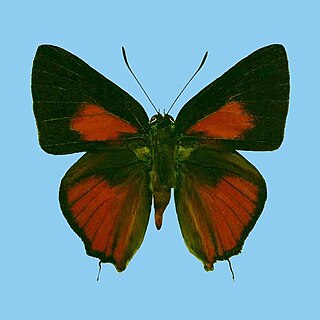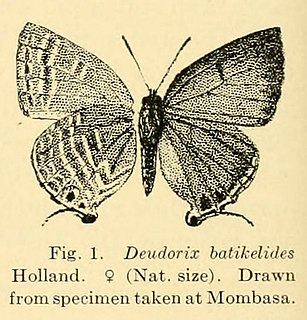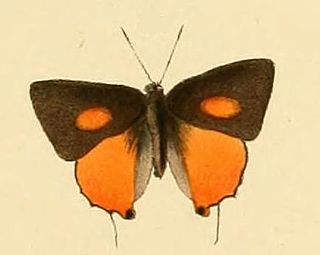
Poritia is a genus of lycaenid butterflies. The members (species) of this genus are found in the Indomalaya ecozone. Poritia was erected by Frederic Moore in 1887.

Deramas is a genus of butterflies in the family Lycaenidae. The genus distributed from south Burma to Sundaland, the Philippines and Sulawesi. Most of the species are rare and endangered, and are confined to forest from sea level to about 5,000 feet (1,500 m).

Deudorix philippinensis is a butterfly of the family Lycaenidae. Its forewing length is 18–25 mm. It is endemic to the Philippines where it is found on the islands of Luzon, Marinduque, Masbate, Mindoro, Panay, Negros, Sibuyan and Mindanao. The female has two forms, with orange or dark brown on the upperside.

Deudorix batikeli is a butterfly in the family Lycaenidae. It is found on Madagascar. The habitat consists of forests.

Deudorix batikelides is a butterfly in the family Lycaenidae. It is found in the Democratic Republic of the Congo.

Deudorix caliginosa, the dark brown playboy, is a butterfly in the family Lycaenidae. It is found in Ivory Coast, Ghana, southern Nigeria, Cameroon, Bioko, Sao Tome & Principe, the Republic of the Congo, Uganda, western Kenya, north-western Tanzania, Malawi, Zambia, Mozambique and eastern Zimbabwe. The butterfly's habitat is forest.
Deudorix edwardsi is a butterfly in the family Lycaenidae. It is found in the Rwenzori Mountains of Uganda and the Democratic Republic of the Congo.

Deudorix galathea, the red-edged playboy, is a butterfly in the family Lycaenidae. It is found in Senegal, Guinea, Sierra Leone, Liberia, Ivory Coast, Ghana, Nigeria, Cameroon and Gabon.
Deudorix kayonza, the false coffee playboy, is a butterfly in the family Lycaenidae. It is found in Sierra Leone, Ivory Coast, Ghana, Cameroon, the Republic of the Congo, the Central African Republic, the eastern part of the Democratic Republic of the Congo, western Uganda and Zambia. The habitat consists of forests.

Deudorix livia, the pomegranate playboy, is a butterfly in the family Lycaenidae. It is found in Senegal, the Gambia, Burkina Faso, Cameroon, Chad, Sudan, Uganda, Kenya, Tanzania, Somalia, Djibouti, Yemen, Saudi Arabia, United Arab Emirates, Oman, Algeria, Egypt and the eastern Mediterranean, including Greece. The habitat consists of savanna, including arid savanna.
Deudorix mpanda is a butterfly in the family Lycaenidae. It is found in Tanzania. The habitat consists of montane areas at altitudes between 1,400 and 1,700 m, with scattered stunted woodland and forest margins.
Deudorix nicephora is a butterfly in the family Lycaenidae. It is found in the Democratic Republic of the Congo and Angola.
Deudorix renidens is a butterfly in the family Lycaenidae. It is found on Madagascar.
Deudorix ufipa is a butterfly in the family Lycaenidae. It is found in western Tanzania and Zambia. The habitat consists of montane areas.

Deudorix wardii is a butterfly in the family Lycaenidae. It is found on Madagascar.

Deudorix smilis is a butterfly in the family Lycaenidae. It was described by William Chapman Hewitson in 1863. It is found in the Indomalayan realm.

Arhopala staudingeri is a butterfly in the family Lycaenidae. It was described by Georg Semper in 1890. It is found in the Indomalayan realm where it is endemic to the Philippines.













